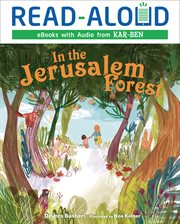Fiction
eBook
Details
PUBLISHED
Made available through hoopla
DESCRIPTION
1 online resource
ISBN/ISSN
LANGUAGE
NOTES
Kar-Ben Read-Aloud eBooks with Audio combine professional narration and text highlighting to bring eBooks to life! A child and her mother take a walk in the forest near Jerusalem, gazing at their reflections in a rippling pond and appreciating their time together. Inspired by the poem "The Pond" by Hayim Nahman Bialik. "Readers will be happily confused by this picture book.Almost every page of the story-based on a piece by Israeli national poet Hayim Nahman Bialik-is gently disorienting. The narrator is a young girl walking through the woods with her mother, and as they look at the reflections in the water, she says, 'The forest is upside-down,' and 'There in the water: the sky!' Kelner takes this as a challenge. In her paintings, the sky is often the same color as the water or the ground, and the characters' clothing matches the nature around them. The most challenging section is when the girl says, 'Ima and I see our reflections in the pond. We look the same, like two drops of rain.' ('Ima' is the Hebrew word for 'Mom.') This isn't quite true. The mother is tall, freckled, and redheaded. The daughter is more compact, and her skin is the pale brown of coffee ice cream. But the paintings include small details that mirror each other so that the characters really do start to look alike. Busheri adds off rhymes to the text at unexpected moments ('same' and 'rain,' 'come' and 'sun'), which is both lovely and a bit startling. The imagery, both in the words and the pictures, is so beautiful that readers may be heartbroken when a ripple in the water takes the reflections away. People will be stunned by this book even if they're too astonished to explain why."-Kirkus Reviews Inspired by "The Pond," a Hayim Nahman Bialik poem, this lovely picture book tells of a mother and daughter's walk in a forest near Jerusalem. As they walk past a small pond, the girl observes their reflections in the pond, looking the same, but upside down. As the wind picks up, the girl becomes wary, wondering where the "upside-down forest" went and asking her mother for a hug. When the sun returns, the world is wonderful again. Illustrated with what appears to be oil pastels and watercolors, the full page and double page depictions of the water's edge, the trees and flowers, and fish and birds convey a sense of calm that is dispelled as the wind goes whoosh and the upside-down reflections are lost. There is much to discuss in this deceptively simple story: how can you tell that the girl and her mother have become worried? Look carefully at the pictures of the water and sky. Can you tell where each begins and ends? Examine the way the mother's dress looks like it blends in with the trees, flowers, and grass near the water. Do the mother and daughter "look the same, like two drops of rain?" The book concludes with an author's note about Hayim Nahman Bialik, and an explanation of the meaning of the poem upon which the book is based. The statement that the poem "is a beautiful exploration of the relationship between Torah and reality" leaves one wondering if the author read an entirely different poem! Based on the poem, "The Pond," by classic Hebrew poet Hayim Nachman Bialik, this peaceful picture book follows a young girl and her mother as they walk together through the Jerusalem forest and gaze at their reflections in a pond. The trees and the sky, reflected in the water, seem upside-down to the sensitive, perceptive girl, giving her and the reader the sense that perspective can be variable and changing; everything can be what it seems to be while also expanding the mind with an appreciation of greater possibilities. Bialik, often called "Israel's national poet," was born in Russia and, late in life, relocated to Israel before it was a state. His poems were written in Yiddish but primarily in Hebrew, and were often about
Mode of access: World Wide Web







